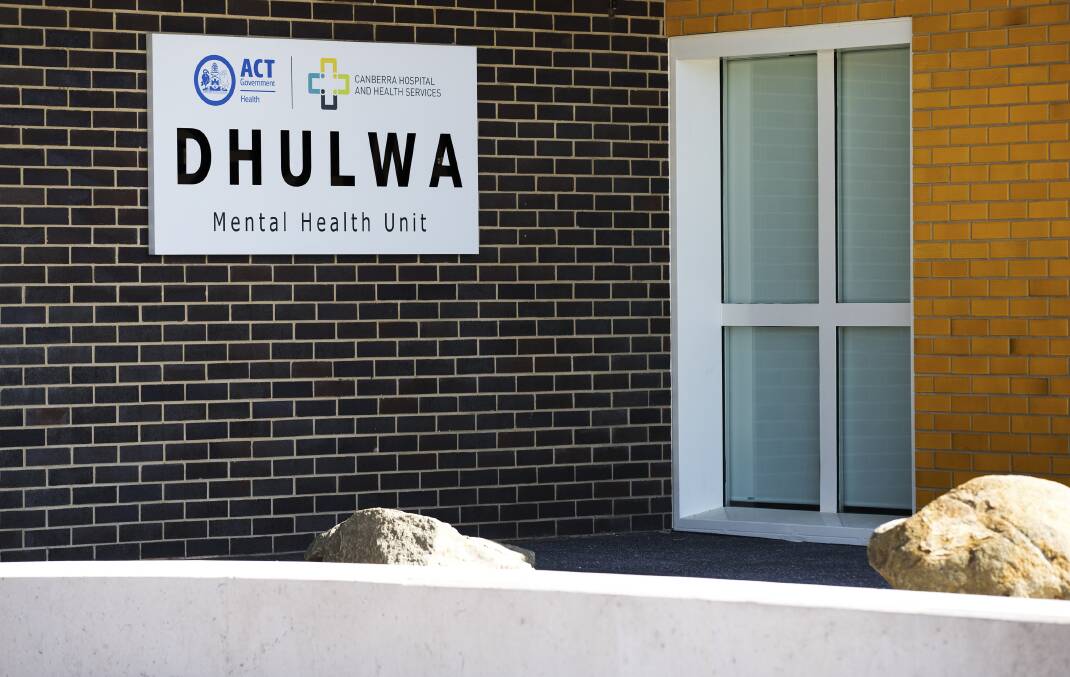
The ACT's workplace safety watchdog has issued improvement and prohibition notices to the Dhulwa Mental Health unit as nurses at the facility have reported more than 100 physical assaults in the space of six months.
The WorkSafe ACT notices were issued to Canberra Health Services last Friday but in the same day the notices were issued The Canberra Times understands that a nurse at the facility lost part of their finger in an incident at Dhulwa.
Australian Nursing and Midwifery Federation ACT branch secretary Matthew Daniel said the WorkSafe ACT notices showed the regulator believed there been contraventions of the Work Health and Safety Act.
"WorkSafe ACT believes there are contraventions of the Work Health Safety and Safety Act 2011 or that it's likely that contraventions will continue to be repeated with a reasonable belief that a serious risk to the health or safety of Dhulwa workers exists because of exposure to an immediate or imminent exposure to a hazard," Mr Daniel said.
"The regulator also noted that control measures in place for occupational violence hazards failed to protect a worker and that the worker was exposed to physical and psychological risk."
WorkSafe ACT confirmed last week it had received complaints about Dhulwa but would not comment further. Mr Daniel said that WorkSafe had attended the facility last Monday.
Under the prohibition notice, staff at the facility are prevented from undertaking high-risk interactions or activities with consumers until all potential occupational violence hazards have been identified. An improvement notice has also been issued.
Staff working at the Dhulwa Mental Health unit have reported more than 100 physicals assaults over a six-month period, with one nurse likening work at the facility to being "sent into the killing fields".
But since those figures were made public earlier this month, nurses have reported that assaults have continued. In one instance, a nurse received a fracture during an assault last week.
Another nurse also suffered an injury after their hand was caught in a door frame when it was pushed by a patient. The Canberra Times has heard the nurse was closing the door when the patient "banged" the door "vigorously". The nurse lost part of their finger and is due to undergo surgery to see if the finger can be saved.
An executive from Canberra Health Services emailed staff on Easter Sunday about the incident to remind them about the dangers associated with heavy doors. The executive said posters would be developed next week to remind staff of the safety considerations of the doors.
Mr Daniel said the WorkSafe intervention was welcomed but this did nothing to alleviate concerns about the culture at Dhulwa, where he said nurses were scared of repercussions from management if assaults were reported. He said nurses felt they had been blamed for violent incidents.
He repeated calls for an ACT government inquiry into Dhulwa.
"Significant questions about accountability remain and nurses deserve an explanation as to why they have been blamed for occupational violence for so long when, in fact, it has been found that the government has failed to keep Dhulwa workers safe," Mr Daniel said.
"These are damaging findings by the safety regulator and the Minister and those responsible for the management of Dhulwa must not escape scrutiny."
Canberra Health Services acting chief executive Cathie O'Neill said the organisation would comply with the WorkSafe notices.
"CHS is working constructively with WorkSafe ACT to ensure that it continues to take every step possible to support our team members at Dhulwa to prevent and manage occupational violence. Occupational violence is never acceptable," she said.
"We'd like to acknowledge the exceptional work team members in our mental health units do every day to support vulnerable members of our community."
Ms O'Neill said where additional controls could be added to operational procedures to further minimise the risk of occupational violence, such controls would be introduced.
"For example, CHS has introduced additional safety huddles during handover at the end of each shift and pre-planning safety huddles prior to high-risk interactions with individual patients at Dhulwa," she said.
"The pre-planning safety huddles ensure managers and team members take time out to examine potential risks, consider how best to mitigate these, and strengthen safety mechanisms where possible."







